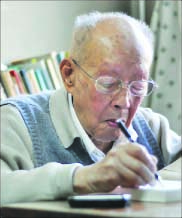
Chinese linguist Zhou Youguang (周有光), who created the writing system using letters from the Roman alphabet to turn Chinese characters into words, died in Beijing on Jan. 14. He was 111.
Zhou changed the way the language was taught and helped raise literacy rates. Born on Jan. 13, 1906 during the Qing Dynasty, Zhou worked as a Wall Street banker in the US as a young man. He returned to China after the communist victory in 1949 and was put in charge of creating a new writing system using the Roman alphabet.
Before Pinyin was developed, 85 percent of Chinese people could not read, now almost all can. Pinyin has since become the most commonly used system globally, although some Chinese communities – particularly in Hong Kong and Taiwan – continue to use the traditional method of writing. It is also widely used on compu-ters and smartphones, leading some to fear it could end up replacing Chinese characters altogether.
Although this achievement shielded him from persecution, he was later sent to the countryside for re-education during Mao’s Cultural Revolution. In his later years, he became strongly critical of the Chinese authorities and wrote a number of books, most of which were banned.